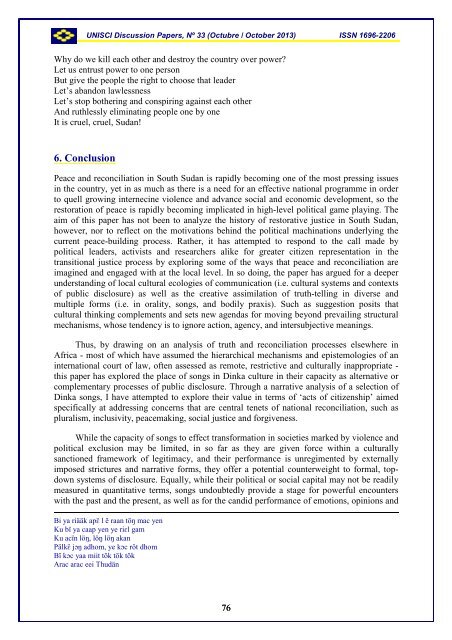UNISCI - Universidad Complutense de Madrid
UNISCI - Universidad Complutense de Madrid
UNISCI - Universidad Complutense de Madrid
Create successful ePaper yourself
Turn your PDF publications into a flip-book with our unique Google optimized e-Paper software.
<strong>UNISCI</strong> Discussion Papers, Nº 33 (Octubre / October 2013) ISSN 1696-2206Why do we kill each other and <strong>de</strong>stroy the country over power?Let us entrust power to one personBut give the people the right to choose that lea<strong>de</strong>rLet’s abandon lawlessnessLet’s stop bothering and conspiring against each otherAnd ruthlessly eliminating people one by oneIt is cruel, cruel, Sudan!6. ConclusionPeace and reconciliation in South Sudan is rapidly becoming one of the most pressing issuesin the country, yet in as much as there is a need for an effective national programme in or<strong>de</strong>rto quell growing internecine violence and advance social and economic <strong>de</strong>velopment, so therestoration of peace is rapidly becoming implicated in high-level political game playing. Theaim of this paper has not been to analyze the history of restorative justice in South Sudan,however, nor to reflect on the motivations behind the political machinations un<strong>de</strong>rlying thecurrent peace-building process. Rather, it has attempted to respond to the call ma<strong>de</strong> bypolitical lea<strong>de</strong>rs, activists and researchers alike for greater citizen representation in thetransitional justice process by exploring some of the ways that peace and reconciliation areimagined and engaged with at the local level. In so doing, the paper has argued for a <strong>de</strong>eperun<strong>de</strong>rstanding of local cultural ecologies of communication (i.e. cultural systems and contextsof public disclosure) as well as the creative assimilation of truth-telling in diverse andmultiple forms (i.e. in orality, songs, and bodily praxis). Such as suggestion posits thatcultural thinking complements and sets new agendas for moving beyond prevailing structuralmechanisms, whose ten<strong>de</strong>ncy is to ignore action, agency, and intersubjective meanings.Thus, by drawing on an analysis of truth and reconciliation processes elsewhere inAfrica - most of which have assumed the hierarchical mechanisms and epistemologies of aninternational court of law, often assessed as remote, restrictive and culturally inappropriate -this paper has explored the place of songs in Dinka culture in their capacity as alternative orcomplementary processes of public disclosure. Through a narrative analysis of a selection ofDinka songs, I have attempted to explore their value in terms of ‘acts of citizenship’ aimedspecifically at addressing concerns that are central tenets of national reconciliation, such aspluralism, inclusivity, peacemaking, social justice and forgiveness.While the capacity of songs to effect transformation in societies marked by violence andpolitical exclusion may be limited, in so far as they are given force within a culturallysanctioned framework of legitimacy, and their performance is unregimented by externallyimposed strictures and narrative forms, they offer a potential counterweight to formal, topdownsystems of disclosure. Equally, while their political or social capital may not be readilymeasured in quantitative terms, songs undoubtedly provi<strong>de</strong> a stage for powerful encounterswith the past and the present, as well as for the candid performance of emotions, opinions andBi ya riääk apɛ̈ l ë raan töŋ mac yenKu bï ya caap yen ye riɛl gamKu acïn löŋ, löŋ löŋ akanPälkɛ̈ jɔŋ adhom, ye kɔc röt dhomBï kɔc yaa miit tök tök tökArac arac eei Thudän76
















